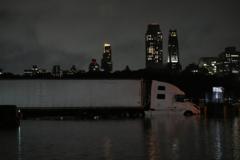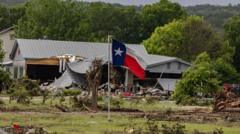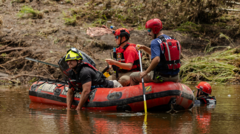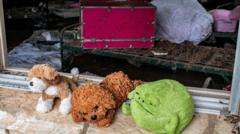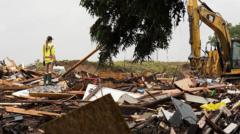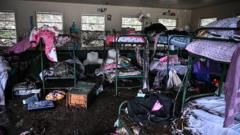Flooding in Kinshasa, the bustling capital of the Democratic Republic of Congo, has tragically resulted in over 33 fatalities, according to local officials. As torrential rains deluge the city, desperate residents are utilizing makeshift canoes and swimming to escape the floodwaters that have engulfed their neighborhoods.
Torrential Rains Devastate Kinshasa: Over 30 Lives Lost in Recent Floods

Torrential Rains Devastate Kinshasa: Over 30 Lives Lost in Recent Floods
Severe flooding in the Democratic Republic of Congo's capital wreaks havoc, claiming lives and displacing residents amid ongoing climate challenges.
Kinshasa, home to approximately 17 million people and situated along the Congo River, is no stranger to flooding. Recent meteorological data indicates that the river has reached its highest levels in sixty years, exacerbated by increasing climate change effects. The city’s infrastructure struggles against natural events, particularly in areas where soil erosion is prevalent—issues highlighted by the Congolese president regarding worsening climate conditions.
The floods that struck on Friday night devastated many homes, especially in western Kinshasa, affecting roughly half of the city’s 26 districts. Some of the hardest-hit zones include impoverished neighborhoods and the outskirts of the capital. Residents like Christophe Bola from the Ndanu area described harrowing experiences, stating, "The water has reached 1.5 meters high...we have just managed to save ourselves; the rest is trapped in our homes."
Local anger towards authorities is palpable, with many residents criticizing the slow response and insufficient rescue efforts. This natural disaster has not only displaced many but also led to severe water supply shortages as treatment pumps become submerged. Critical infrastructure, including the primary route to the international airport and the motorway to the main port of Matadi, remains impassable.
In a recent assessment, Deputy President Jacquemain Shabani noted that the N’djili River, a tributary of the Congo River, has overflowed, trapping residents in some areas. This river is notorious for its pollution, often containing hazardous levels of waste due to inadequate sewage management and lack of urban planning.
To compound matters, forecasts predict continued heavy rainfall impacting northern and northeastern regions of the Democratic Republic of Congo in the ensuing days. As officials mobilize search and rescue teams, the residents of Kinshasa grapple with both immediate and alarming long-term implications of climate-induced disasters.
The floods that struck on Friday night devastated many homes, especially in western Kinshasa, affecting roughly half of the city’s 26 districts. Some of the hardest-hit zones include impoverished neighborhoods and the outskirts of the capital. Residents like Christophe Bola from the Ndanu area described harrowing experiences, stating, "The water has reached 1.5 meters high...we have just managed to save ourselves; the rest is trapped in our homes."
Local anger towards authorities is palpable, with many residents criticizing the slow response and insufficient rescue efforts. This natural disaster has not only displaced many but also led to severe water supply shortages as treatment pumps become submerged. Critical infrastructure, including the primary route to the international airport and the motorway to the main port of Matadi, remains impassable.
In a recent assessment, Deputy President Jacquemain Shabani noted that the N’djili River, a tributary of the Congo River, has overflowed, trapping residents in some areas. This river is notorious for its pollution, often containing hazardous levels of waste due to inadequate sewage management and lack of urban planning.
To compound matters, forecasts predict continued heavy rainfall impacting northern and northeastern regions of the Democratic Republic of Congo in the ensuing days. As officials mobilize search and rescue teams, the residents of Kinshasa grapple with both immediate and alarming long-term implications of climate-induced disasters.


